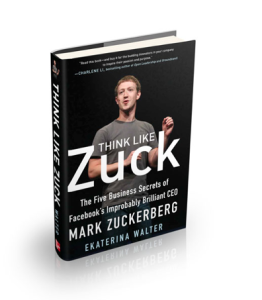At the age of 28, Mark Zuckerberg is the world’s 29-richest person and his company Facebook has over one billion users worldwide, only eight years after it was set up. Yet Zuckerberg “never wanted to run a company,” he said. “To me a business is a good vehicle for getting stuff done.”

In her book she explores the qualities of great leaders, what it means to have a “Think Like Zuck” type of mentality, and how to build successful companies. Packed with examples of Facebook’s success principles in action—as well as those of Zappos, TOMS, Threadless, Dyson, and other companies—the book gives you the inspiration, knowledge, and insight to make your own mark in the world, to build a business that makes a difference, and to lead your organization to long-term profitability and growth.
Below are just some of the insights.
Passion and Purpose
What’s the difference between Passion and Purpose? Passion is what drives you, what makes you keep going despite all the setbacks. In the words of Steve Jobs (during his 1995 interview with the Smithsonian Institute): “I’m convinced that about half of what separates the successful entrepreneurs from the non-successful ones is pure perseverance.” The most successful entrepreneurs never give up.
Purpose, on the other hand, is the reason your company exists. The letter which accompanied Facebook’s IPO prospectus opens by declaring: “Facebook was not originally created to be a company. It was built to accomplish a social mission – to make the world more open and connected.” Facebook’s success can be attributed to the fact that even as the company grew it remained true to its purpose of trying to connect people in the simplest way possible. All of its most important innovations, such as the Wall, the News Feed, photo tagging and Groups, have come out of this sense of purpose.
People, Products and Partnerships
A company’s purpose drives its decisions about the people it hires, the products it makes and the partnerships it forges. The clearer the sense of purpose, the more focused these decisions will be. Companies such as Facebook and Zappos have a rigorous screening process for new employees: they don’t just want the right skills, they want people who will contribute to the company’s strong culture. In his book, Delivering Happiness, Zappos CEO and founder Tony Hsieh says his employees: “are the only competitive advantages that we will have in the long run. Everything else can and will eventually be copied.”
Hiring the right people, having a strong sense of purpose, and infusing the company with his passion have all shaped Zuckerberg’s hugely successful product. Facebook’s design and its business model are aligned with Mark’s purpose of connecting the world. He has put the user experience at the center of his vision even to the extent of attracting criticism from his investors: his pursuit of growth over money has not always been seen as sound business management.
Zuckerberg would be the first to admit that he is not a born business leader, but one of the strengths of successful entrepreneurs is to know your weaknesses and create the right partnerships to balance this out. At Facebook, Zuckerberg brought in Sheryl Sandberg to be his COO, and her business strategies have been responsible for much of Facebook’s prosperity. Partnerships might be with an individual, a company, or with the right investors: the best business leaders know that success is a team sport.
Facebook has grown and developed in response to the needs of its users and the changing way we use the internet. It will continue to evolve as its user needs change. By aligning his work with his passion Mark Zuckerberg has created a product that has revolutionized the way we connect on a global level, and Facebook will continue to drive the future of social networking into the future. Pick up the book and learn from some of the best leaders of our time!

